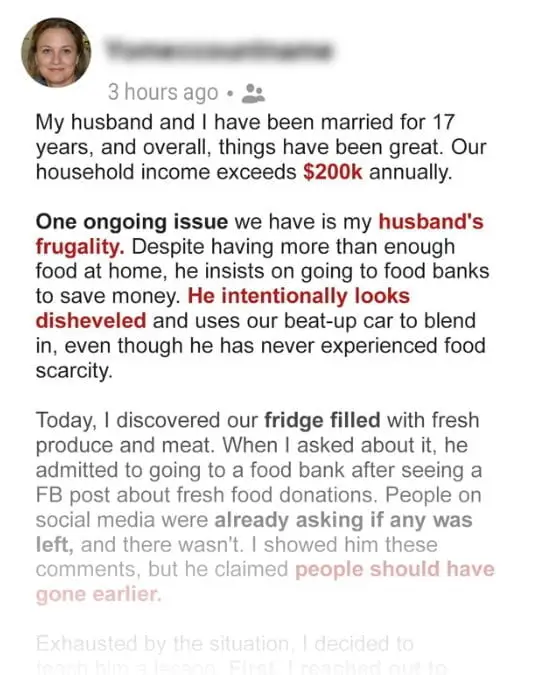After discovering her husband repeatedly using food banks despite their comfortable income, Celine concocts a unique plan to teach him the real value of community resources.
Will her eye-opening strategy deepen their understanding or open a rift in their relationship?
Hi, everyone! My name is Celine, and today I need to vent a little about something that’s been bothering me for a while.
My husband, Kris, and I have been together for 17 years—married life has been mostly wonderful and we’re pretty fortunate financially.
We make over $200,000 a year, so we’re not exactly pinching pennies.
But here’s the kicker: Kris has this thing about being super frugal, to the point of extremes.
Despite our fridge being fully stocked and us having the means to comfortably buy whatever we need, Kris has this habit of hitting up local food banks.
And it’s not that he volunteers; he goes there to get food.
The first time I caught him doing this, I couldn’t believe my eyes.
He walked into the house with bags full of canned goods, bread, and some vegetables.
At first, I thought he’d been shopping at a discount store or something.
But no, he had this look on his face, a mix of guilt and defiance.
“I saved us a bunch of money.” He said, trying to justify it.
He tries to blend in with those who genuinely need these services.
He’d wear his oldest clothes, take our oldest car—the one that seriously needs a paint job—and drive down to the food bank.
He acts as though we’re on the brink of financial ruin, which is so far from the truth.
I’ve tried to talk to him about it.
I’ve told him that there are people out there who really need those resources.
Moreover, I’ve shown him posts on social media, from local food banks, highlighting the need for donations and how they’re struggling to meet demand.
But it just doesn’t click with him.
He shrugs and says, “There’s enough to go around.”
So today when I opened our fridge—guess what?
It was packed with fresh produce and nice cuts of meat.
Confused and a bit upset, I asked Kris where it all came from.
He sheepishly admitted, “I went to the food bank again.
There was a post on Facebook about a big donation they received, and I thought why not?”
I immediately pulled up the Facebook post he was talking about.
People were already commenting, asking if any of the food was left.
Unfortunately, they were out of luck—nothing was left.
I showed these comments to Kris, trying to make him see the direct impact of his actions.
But he just brushed it off, saying, “Well, they should have gotten there earlier.”
I was so frustrated.
I felt like nothing I said made any difference.
But then, an idea hit me—a plan that would hopefully teach him the true value of these food banks to our community.
I reached out to the director of the local food bank, explaining the whole situation.
I told them how Kris has been abusing their generosity, despite us not being in need.
The director, incredibly understanding, suggested a brilliant idea.
They proposed that the next time Kris showed up, instead of turning him away, they’d put him to work.
This way, he could really see the kind of need they deal with daily and hopefully, this would make him rethink his actions.
The director was incredibly supportive, seeing this as a chance to educate and possibly transform Kris’ perspective.
We set everything up and waited for the day he would walk into the food bank again.
The day I knew Kris would probably hit up the food bank, I nudged him a bit.
“Honey, why don’t you wear your oldest jacket? You know, to look the part,” I suggested, trying to keep my voice casual.
He grumbled about it but finally agreed, not knowing he was walking right into the lesson I had arranged for him.
When he walked into the food bank, instead of the usual quick grab and go, something different happened.
He was greeted by name as soon as he stepped in.
The volunteers, who were all in on the plan, gave him a warm but knowing smile and ushered him straight to the back.
“Since you come here so often, we’d really appreciate your help in sorting today’s donations,” one of them said.
Kris was totally baffled but with all eyes on him, he couldn’t just walk out.
So, he spent the entire day at the back of the food bank, sorting through boxes of food donations.
It wasn’t the day he had planned.
As he worked, he started chatting with the other volunteers and some of the people who came in needing help.
He listened to their stories—families scraping by, single parents working two jobs just to feed their kids, elderly folks whose pensions just weren’t enough.
These were the people who really needed the help that the food bank provided, the people Kris had been unknowingly taking from.
It was an eye-opener for him.
Being so close to the real struggles of these people, hearing their stories firsthand, it was a whole different world.
One he had never truly seen, even though he had been coming to this place for months.
While Kris was having his eye-opening experience at the food bank, I was setting up something special at home.
I invited a few friends from our community, including those who had shared their stories on social media about how the food bank had supported them during tough times.
We prepared a small gathering, aiming to create a space not just for sharing but to highlight the real impact of community support.
When Kris returned, he was visibly tired but seemed to carry a more reflective aura than when he left that morning.
He walked into our living room and found it filled with unfamiliar but friendly faces.
Each person took a moment to share their story, explaining how
Doesn’t end here — it continues on the next page. Tap READ MORE to discover the rest 🔎👇





